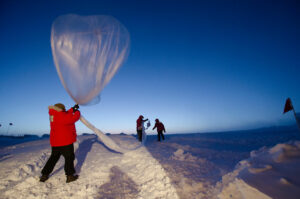No, climate scientists aren’t being forced to exaggerate

IT READS like a climate denier’s dream come true: A prestigious climate scientist publicly confesses he fudged research in order to get published.
That’s basically how excited headlines in right-wing media have portrayed scientist Patrick Brown’s claim this week that he oversold the influence of climate change on wildfire risks in order to get a paper published recently in the prestigious journal Nature.
But the real story isn’t quite that simple.
At the top of his would-be mea culpa, Brown links to a column I wrote about last month’s Maui wildfires, citing it as an example of how the media contributes to a narrative that such conflagrations are “mostly the result of climate change.” While I appreciate the link, I must point out that nowhere in my column do I argue climate change was the primary cause of the Maui fires. I do strongly suggest it was a contributing factor, with much of the leeward side of the Hawaiian islands trapped in a drought cycle that has and will continue to be exacerbated by global warming.
But of course a host of other factors contributed to the Maui disaster, from questionable land management to human error. Assigning a precise percentage of the blame to climate change is impossible, at least for me, and probably for any actual scientists.
That sort of thinking should feel familiar to Brown, because that’s pretty much exactly how his Nature paper about wildfires begins, except more science-y:
“Some portion of the change in wildfire behavior is attributable to anthropogenic climate warming, but formally quantifying this contribution is difficult because of numerous confounding factors…”
In the rest of the paper, Brown and his seven co-authors use machine learning to try to figure out how climate change has affected, and will continue to affect, the risk of wildfires, mainly by drying out fuel such as undergrowth and grass (as happened in Maui, for example). They found, to a reasonable degree of certainty, that climate change has in fact increased wildfire risk in the recent past and will increase it even more in the near future. The paper is well-reasoned, not obviously overhyped, and peer-reviewed. It echoes many other recent studies with similar findings. Brown even stands by it.
But Brown also claims, in his column in The Free Press, a media company founded by former New York Times writer Bari Weiss, that he and his co-authors “didn’t bother to study” other factors contributing to wildfires, limiting their analysis to climate change. This decision was made, according to Brown, to ensure the paper fit a narrative that climate change is the world’s primary problem and that reducing greenhouse-gas emissions is the only solution. Veering from that path will cause prestigious journal editors and peer reviewers to reject your paper, Brown says, forcing you to resort to lesser publications, to the detriment of your career.
“[T]he editors of these journals have made it abundantly clear, both by what they publish and what they reject, that they want climate papers that support certain preapproved narratives — even when those narratives come at the expense of broader knowledge for society,” Brown writes.
And yet energy and climate consultant Richard Black did a quick survey of just the past month’s publications in Nature and found papers:
• suggesting Amazon deforestation is primarily the result of shoddy law enforcement;
• blaming a severe rainfall event in Japan on ocean waters mixing;
• suggesting underlying social vulnerabilities were more to blame than climate for extreme-weather disasters.
That third paper was co-authored by Friederike Otto, a pioneer in the burgeoning science of attributing extreme weather events to climate change. That work has practically won her household-name status as a climate Cassandra, a high-profile career she apparently doesn’t mind risking by countering Brown’s alleged narrative.
All of which suggests Nature has no problem publishing research that counters said narrative. Nature’s editor in chief, Magdalena Skipper, has denied that her publication pushes any agenda and criticized Brown for trying to manipulate it.
Skipper also pointed out that peer reviewers suggested Brown should include other wildfire factors in his research beyond climate, but he argued (pretty convincingly) that it wasn’t necessary for the purposes of his paper. This suggests not only that Brown’s work might have had an easier time getting published had those factors been included, but also that, if any censorship was happening in the climate-science community, it was Brown censoring himself.
It’s true that there is an allure, at least for those of us in the media, to lean into the lurid when it comes to climate. It’s difficult to get readers to pay much attention otherwise. If it bleeds it leads, and all that. But it’s also true that most climate scientists and writers still take great pains to avoid being too apocalyptic or definitive in their declarations, lest they be accused of doom-mongering that would incite climate deniers and trigger unproductive despair in normal people. Many of us think and argue constantly about such messaging. That’s a healthy thing.
Pretending otherwise, as Brown’s piece and its jubilant aggregators in right-wing media are doing, only gives comfort to climate deniers, confuses the science and makes real action far more difficult.
It so happens that Brown is the co-director of the climate and energy team at the Breakthrough Institute, a nonprofit known for courting controversy and pushing “ecomodernism,” or relying on technology to help humanity adapt to climate change. Implied is the idea that global warming isn’t as catastrophic as many scientists warn it could be, further implying that action to transition from fossil fuels isn’t so urgent. If any narrative is dangerous and needs debunking, it’s that one.
BLOOMBERG OPINION




